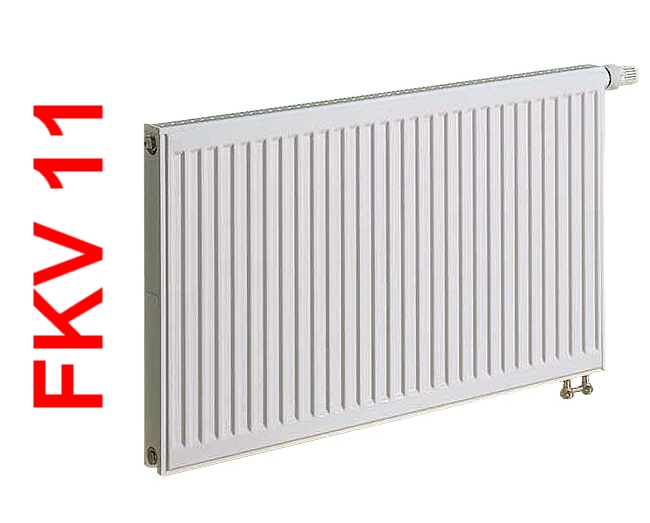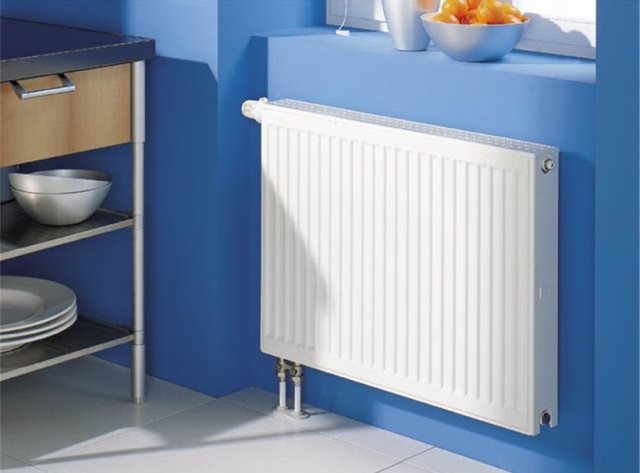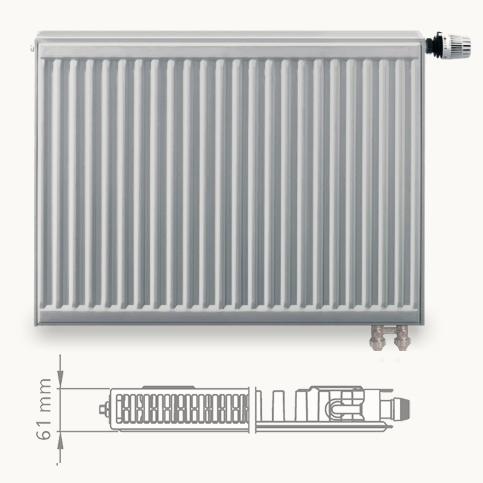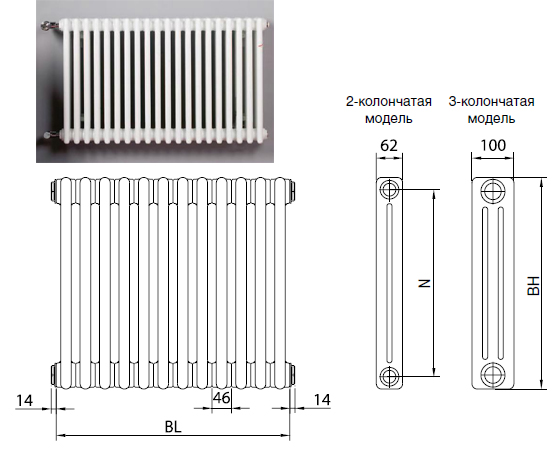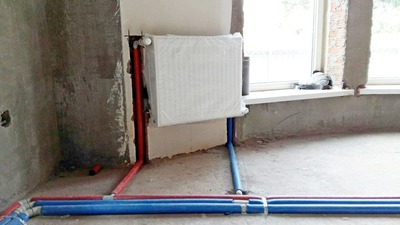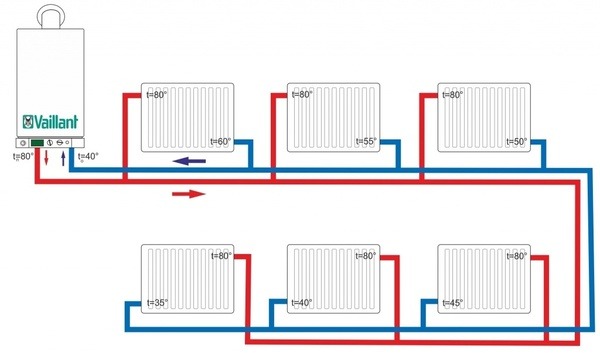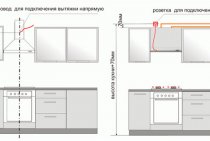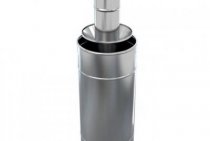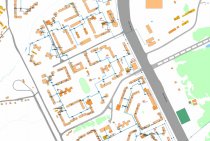Models Kermi FTV 11
Radiators with a bottom connection of this type are versatile in design and excellent in quality, but are suitable for small spaces. Batteries provide heat with a convection element and just one panel. This type of heating equipment has the following properties:
- high-strength carbon steel has a powerful heat dissipation;
- the presence of a corrugated panel provides heat dissipation around the entire perimeter;
- working pressure - 10 bar;
- bottom connection through two external pipes.
Price
The price of heaters depends on the individual characteristics of each model. The cost is affected by height, width, capacity, heat transfer. The higher the score, the higher the cost. A few examples:
- heating radiators with a height of 300 mm, a width of 400 mm, a heat output of 298 W and a capacity of 0.72 liters cost 2,500 rubles;
- heaters 600x1200 mm with a heat output of 1615 W and a capacity of 3.78 liters cost 5000 rubles;
- a kermi radiator 900x3000 mm with a heat output of 5778 W and a capacity of 13.5 liters cost an average of 13,000 rubles.
The minimum cost of heating equipment is 2,500 rubles, the maximum can reach up to 21,000 rubles.
Peculiarities
Unlike standard heaters with a pressure of 8.7 bar, kermi radiators maintain a pressure of 10 bar. All models exhibit high heat transfer coefficient and low energy absorption.
Description of famous manufacturers
The most famous companies producing batteries with a lower connection scheme are Kermi, Rifar, Zender, Purmo, Regulus. To have an idea about the products of these companies, you can consider the main characteristics:
1. Kermi.
All models of the German manufacturer have an aesthetic appearance, they are compact and easy to install. The batteries are equipped with a unit that serves only one room without affecting the rest of the rooms. Kermi bimetallic radiators with bottom connection are panel and tubular type. They have a built-in thermostat that allows you to control the temperature of the air in the house.
- FTV11 is suitable for small rooms, provides heating with one panel and convection heating method.
- FTV12 are made of high carbon steel, treated with anti-corrosion varnish. The connection is made through two external conical holes.
2. Rifar.
Sections of Russian steel heating radiators are made to ensure maximum heat transfer and high strength. Depending on the area of the room, the number of heating elements of the batteries can be varied. The main feature is that they are adapted to domestic conditions and harsh climate, have a low price.
- The Alum model is designed to work in a heating system at a temperature of 120 C. The products are made from an aluminum alloy by casting, the pressure is 2 MPa.
- The Monolit brand is bimetallic radiators from the bottom connection. The most powerful is the unit with a center distance of 500 mm, which makes it suitable for installation in large rooms.
3.Zender.
Products of the German manufacturer are characterized by high quality, which is associated with the nuances of the manufacturing process. This is due to laser welding, in which the number of seams is controlled by a computer. Therefore, during operation, even at the highest pressure, the risk of leakage is practically reduced to zero.
- The Charleston PRO model is a battery with a bottom one-sided connection. Thanks to special processing differ in the increased corrosion resistance.
- Completto is suitable for a two-pipe scheme, it is completed with a thermal valve without fail. Are used only in systems of the closed type, without access of oxygen.
4. Purmo.
Sections made by a Finnish company can be profiled or smooth.They have reduced inertia, increasing heat transfer and warming up the room faster. Steel and bimetallic radiators are covered with a high-quality anti-corrosion layer. White equipment is on sale, but you can order any shade that suits the interior.
- The Compact model is available with convection elements. The side surfaces are covered with special overlays. Products with a lower connection scheme are equipped with a built-in valve.
- The Hygiene brand features a sleek front panel that fits well into modern interiors. It is intended for installation in rooms with increased hygienic requirements.
5 Regulus.
Equipment manufactured by a Polish company from an alloy of copper and aluminum. Suitable for installation in various buildings, including those with high humidity. They operate at a pressure of 15 atmospheres and a carrier temperature of 110°C. Units with a bottom connection are compact, have low thermal inertia, and are resistant to corrosion. Operates with a small volume of liquid. RD models are used with pipelines of any material, there are no restrictions on the choice of the boiler. Products are equipped with a thermal valve, a set of gaskets and mounting elements.
https://youtube.com/watch?v=esXEbda3_qg
Price
To buy a suitable option for the heating system, it is important to take into account the connection features, material and parameters of the area of \u200b\u200bthe room. The price range of different manufacturers is indicated in the table:
| Model | Dimensions, mm | Heat transfer parameters, W | Price, rubles |
| Kermi, Germany
FTV11 FTV12 |
400/3000x300/900x65 400/3000x300/900x65 |
300-6000 400-2500 |
3000-15000 3000-7000 |
| Russia
Alum Monolith |
500x900x70 600x1000x100 |
500-2000 700-3000 |
1500-2500 2000-6000 |
| Zender, Sweden
Charleston PRO Completto |
200/3000x100/2500x60 200/3000x100/2500x200 |
600-4000 600-7000 |
4500-7000 5000-8000 |
| Finland
Compact hygiene |
400/3000x300/1000x50 400/3000x300/1000x150 |
1200-3500 1000-2500 |
2000-5000 3000-7500 |
| Poland
RD 2/100 RD2/200 |
200x1000x100 200x2000x200 |
1000 2200 |
3000-3500 4500-5000 |
Differences between them
The difference between the concepts described is as follows:
- The supply is a coolant that goes through the radiators from the heat source.
- The return is a liquid that has gone through the entire circuit, and cooled down again to the heat source for subsequent heating. Therefore, it happens at the output.
- Difference in temperature: the return is colder.
- Installation difference. The conduit that is attached to the top of the battery is the feed. What is attached to the bottom is the return line.
Important! Some tips must be followed. The entire system must be completely filled with water or antifreeze.
Maintaining fluid velocity, circulation, and pressure is just as important.
Temperature difference across radiators
The temperature difference must be 30 °C. At the same time, the batteries will be approximately the same to the touch.
It is important to ensure that the difference between these values is not too large.
Photo 2. Heating scheme for 6 radiators: changes in the supply and return temperatures on each of them are indicated.
Manufacturer's Description
 Kermi heating radiator
Kermi heating radiator
Date of foundation of the German company "Kermi" - 1960. The main profile of its activity is the production of panel-type heaters and modern shower cabins. A distinctive feature of Kermi heating radiators is the presence of two connection methods, as well as various versions. In addition to standard steel structures, the manufacturer offers relatively inexpensive bimetallic products.
A characteristic feature of German radiators is a high level of heat transfer, surpassing that of models from other well-known manufacturers. It can be achieved due to the high efficiency of heat exchange processes occurring inside the heating system. Kermi heating radiators are ideal for installation in autonomous lines with low operating pressure (in a cottage or a country house, for example).
